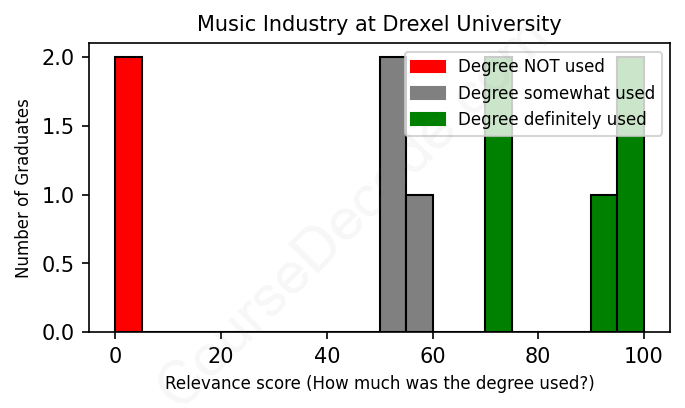
First, some facts. Of the Music Industry graduates from Drexel University we've analyzed , here's how many have used (or NOT used) their degree in their career:

These are estimates based on AI analysis of 10 LinkedIn profiles (see below).
The verdict? Below average. Overall, with an average relevance score of 59%, Music Industry graduates from Drexel University have a lower likelihood (-8%) of finding work in this field compared to the average graduate across all fields:
And for comparison, here's the chart for all profiles we've looked at across all degrees.
Also, after graduating, only 30% of these graduates have pursued further education other than another Bachelor's degree (such as a Masters degree or other), compared to the average across all profiles of 35%. This suggests a Bachelors degree is enough for most Music Industry graduates, and it's normal to look for work straight after graduation.
See the details:
|
Relevance score: 93% We think this person has gone into a career highly relevant to their degree. We think this person has gone into a career highly relevant to their degree.
DEGREE INFOGraduated in 2012 from Drexel University with a Bachelor of Science (BS) in Music Industry. No other secondary education since. JOB HISTORY SINCE GRADUATIONBicycle Mechanic Erlton Bike Shop Mar 2013 - Dec 2013 Engineer  Big Bad Sound LA Feb 2014 - Present ABOUTNo information provided. |
The top 10 most common jobs done by the graduates we've analyzed (ranked most common to least) are:
From the LinkedIn profiles of graduates with a degree in Music Industry from Drexel University, it’s clear that many of them have ventured into a diverse range of jobs. The most common roles are quite varied, including positions like Production Manager, Operations Analyst, and educators in non-music related fields. Many graduates have ended up in jobs that, while reflecting their abilities, do not directly connect to the music industry in a meaningful way, such as working in analytics, banking, or teaching. Even those with roles at institutions like ASCAP or SoundExchange are outnumbered by peers who work in areas that don’t leverage their music industry education at all.
However, there are standout roles that truly connect back to the music industry, such as Engineers at recording studios, Entertainment Technicians, and those in licensing positions. These jobs genuinely reflect the skills and knowledge acquired during their studies and showcase how a Music Industry degree can be applied in specialized areas. Overall, while some graduates indeed find their way into relevant roles, a significant portion drift into jobs that may not utilize their music training, leading to a mixed bag in terms of relevance to their degree.
Here is a visual representation of the most common words in job titles for Music Industry graduates (this is across all Music Industry graduates we've analyzed, not just those who went to Drexel University):

So, looking at the career paths of Drexel University graduates with a degree in Music Industry, it seems there's a pretty mixed bag of outcomes. For many graduates, their first jobs after college often veer away from the music industry. For instance, some have ended up in roles like personal banking, teaching, or even as bicycle mechanics. This might not give the impression of a direct path to a vibrant career in music right out of the gate. However, as they accumulate experience, a good number of them eventually transition into more industry-related roles like audio engineering or media management, but it often takes a few years to pivot towards that.
Fast forward five or ten years, and we see a somewhat more promising picture. A number of these graduates find their footing in the music or entertainment sectors, which is great! For example, some have moved into significant positions at companies like ASCAP and even Google, suggesting that their initial detours might have helped them develop skills that are applicable in the industry later on. That said, there are still those who remain in entirely different fields or non-music-related jobs, highlighting that while a degree in Music Industry can open doors, the path may not always lead directly to the music scene. Overall, a mix of successes and diversions seems to summarize their career trajectories!
The Bachelor degree in Music Industry at Drexel University can be pretty challenging, but it’s also a ton of fun if you're really into music and the behind-the-scenes stuff that goes with it. You’ve got a mix of music theory, business classes, and all sorts of practical projects that can keep you on your toes. If you’re passionate about music and ready to put in the work, like juggling assignments, group projects, and sometimes even late-night studio sessions, it’s definitely doable. But don’t expect an easy ride; it’s more about being engaged and dedicated than just breezing through your courses. Overall, if you love music and are ready to dive deep into the industry, it's challenging but rewarding!
Most commonly, in the LinkedIn profiles we've looked at, it takes people 4 years to finish a Bachelor degree in Music Industry.
Looking at these Drexel music grads, it seems like most of them have found decent-paying jobs, especially those who graduated earlier. For instance, the grad from 2011 has climbed the ranks at Moody's Analytics, which usually pays pretty well, while the 2012 grad might not be raking in the big bucks as a bike mechanic but has stuck with a cool engineering gig. The 2015 grad has worked their way into becoming a dean, which usually comes with a nice paycheck, and a 2017 grad just secured some positions at Google and other solid companies, hinting at a good salary ahead. The more recent graduates are still building their careers, so they might not be making bank just yet, but they’re getting some solid experience. Overall, it seems like most of these folks are doing alright financially, with plenty of potential to earn even more as they progress in their careers.
Here is a visual representation of the most common words seen in the "about" section of LinkedIn profiles who have a Bachelor degree in Music Industry (this is across all Music Industry graduates we've analyzed, not just those who went to Drexel University). This may or may not be useful:

Here are all colleges offering a Bachelor degree in Music Industry (ordered by the average relevance score of their Music Industry graduates, best to worst) where we have analyzed at least 10 of their graduates:
| College | Score | Count |
|---|---|---|
 Drexel University Drexel University
|
59 | 10 |